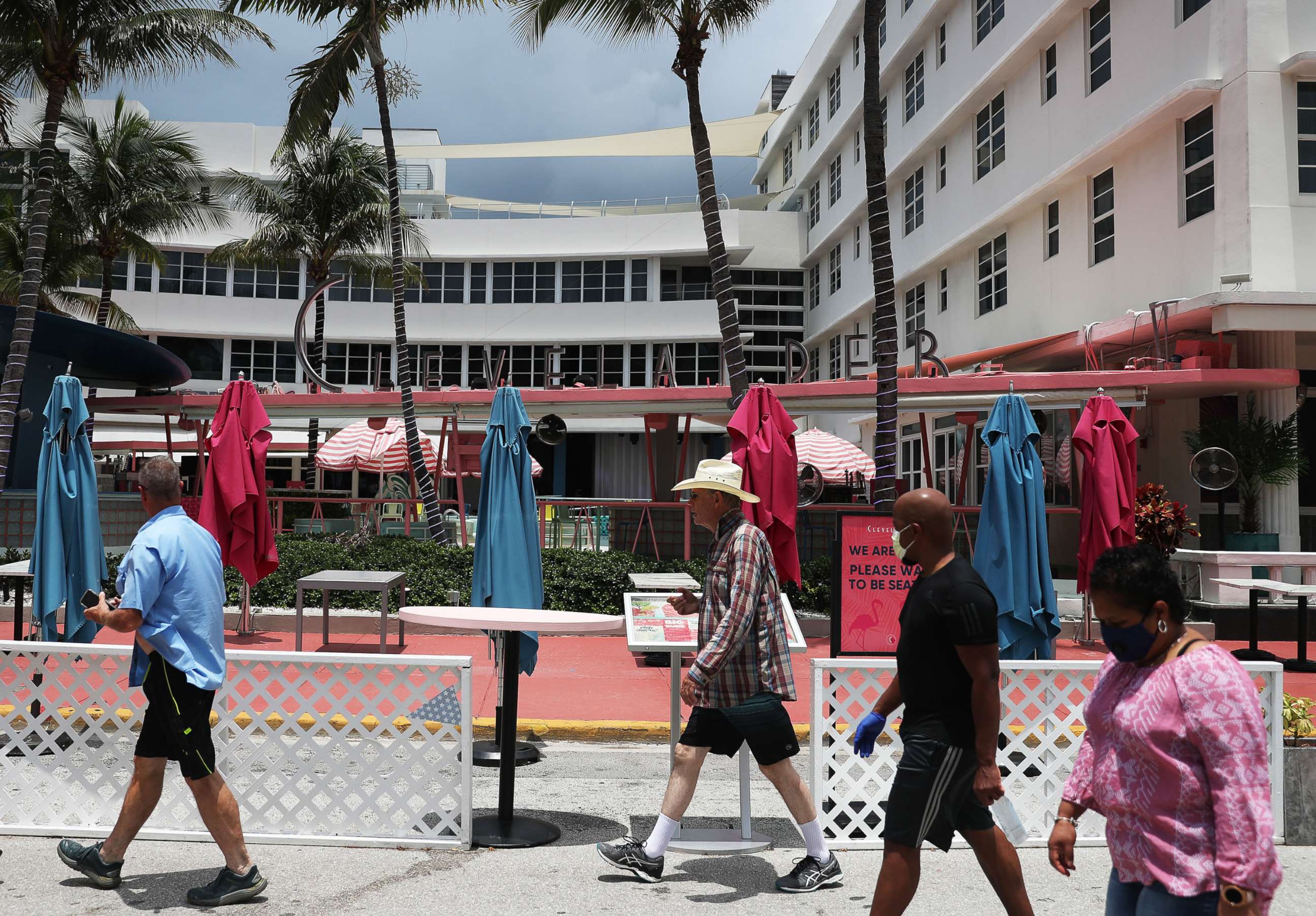Leaders in states seeing 'out of control' coronavirus surges debate mask mandates, rolling back reopenings
Officials from Florida, Arkansas and Colorado appear on ABC's "This Week."
As coronavirus cases continue to surge across a wide swath of the United States, the public debate over face mask requirements and reopenings is pitting several state and federal leaders against the White House, with Americans frequently receiving mixed messages.
On ABC's "This Week," leaders from three affected states, Arkansas, Colorado and Florida, discussed the recent spike and the efforts they feel are necessary to prevent further spread.
"The residents here are terrified, and I'm terrified for the first time in my career because there's a lack of leadership," Rep. Donna Shalala, D-Fla., said Sunday. "We simply have not gotten our arms around this."
Shalala, a former secretary of Health and Human Services during the Clinton administration, told "This Week" Co-anchor Martha Raddatz that, given the virus numbers in her Miami congressional district, talk of reopening schools next month was "ridiculous," despite President Donald Trump's ardent opposition. She added her belief that economic activity in the region should again be restricted.
"The real thing we need to do is we need to close down again," said Shalala. "I said four months ago, if we don't do this right, we're going to have to close down again. That's our worst nightmare, and we're going to have to do that in Florida."
Despite a swelling number of cases -- over 80,000 in the past week alone -- Florida Gov. Ron DeSantis has said that the state is "not going back" on its reopening plans as other states have done, claiming "people going to a business is not what's driving (the surge)." Fellow Republicans, including Trump on Sunday, have claimed statements on closures such as Shalala's are politically motivated.
"The Democrats want to keep the economy closed as long as possible because they think that's good for elections," Trump said on "Fox News Sunday."
As of Saturday, 3.6 million COVID-19 cases have been diagnosed in the United States, and nearly 140,000 people have died of the coronavirus, according to data collected by Johns Hopkins University. In the past week, 19 states, including Arkansas and Florida, set single-day records for their number of positive cases, and the nation's death toll has spiked 19%.
Pressed by Raddatz about how already struggling business would cope with another shutdown, the congresswoman pointed to South Florida's economic reliance on tourism and "crowds," and took a long-term position on the dilemma.
"Our economy will not come back until we meet this virus at its head and knock it down," she said. "We simply cannot protect the economy if we don't protect the lives of people in our community."

In Arkansas and Colorado, Govs. Asa Hutchinson and Jared Polis, a Republican and Democrat, respectively, each announced statewide mask mandates to combat rising case numbers, and agreed on "This Week" Sunday that the requirement was necessary, despite not wanting to infringe upon their constituents' freedoms.
With data demonstrating the efficacy of face coverings and a new ABC News/Washington Post poll showing two-thirds of Republicans wear masks when around others, Raddatz asked Hutchinson why the president was opposed to a national mandate and disagreed with Centers for Disease Control and Prevention Director Dr. Robert Redfield's claim that universal mask wearing could bring the pandemic "under control" in a matter of weeks.
"How is that helpful to a governor like you who wants people to wear masks?" asked Raddatz.
"Well, I don't support a national mask mandate. I think the states are addressing this," Hutchinson said, adding that it was "important" for the president to wear a mask -- something he has only done once publicly. "We need to wear a mask. That example needs to be set by our national leadership," the governor said.
"(The mask mandate was) not something I wanted to do, but it's something everybody can do to relieve the pressure on our hospitals, to give us a hope to bring down those cases and so we've taken the steps that are necessary," he added. "If we have to put in additional restrictions, we will."
Polis acknowledged concerns about "tell(ing) people what to wear or what to do in their lives," but said Colorado's data showed that the areas of the state with mask requirements had "15 to 20% more mask usage and lower spread of the virus," making a statewide order an "easy decision."
In the ABC News/Washington Post poll, 96% of Democrats responded that they wear masks around others, a 30-point difference compared to Republicans, raising questions about the politicization of the issue. Both governors stressed Sunday that "it shouldn't be about politics," as Hutchinson put it.
"I think what's important for people to know is that this is not ideological, it's not partisan, it's science-based," said Polis. "Masks are a ticket to more freedom. It makes it less likely that businesses will be shuttered, it makes it less likely that people will die, it makes it more likely school will return."
"Democrats, Republicans, independents, Greens, Libertarians -- doesn't matter," he continued. "If we care about those things, you're going to take that as a matter of personal responsibility to wear a mask, protect yourself, protect others, protect our economy."




